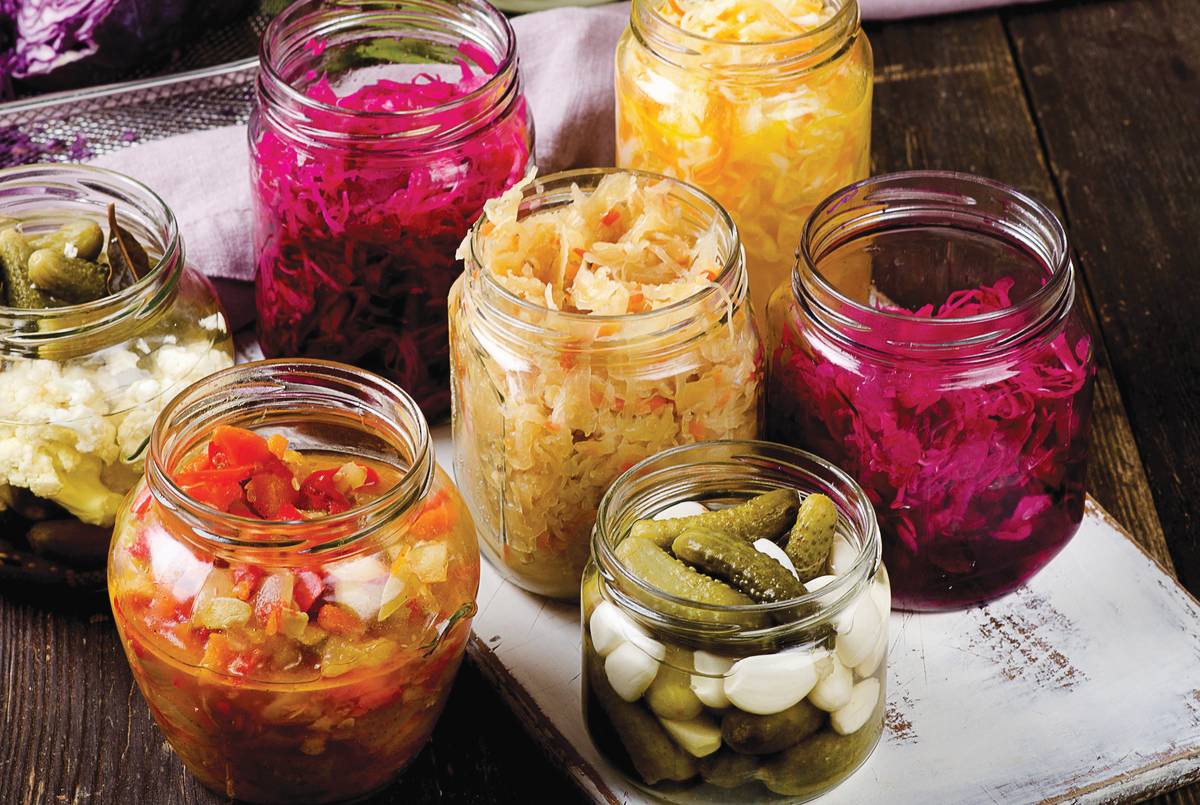How the Gut Microbiome Impacts Our Health, According to Delaware Experts
Share
Adobe Stock
Emerging studies show that overall health—from immune function to mental well-being—begins with our microbiome.
The old adage that we are what we eat originated with French lawyer Anthelme Brillat-Savarin, who coined the term in 1826 in Physiologie du goût, ou Méditations de gastronomie transcendante. (“Tell me what you eat, and I will tell you what you are.”)
What Savarin almost certainly didn’t realize at the time is that what we are—our physical and mental well-being—can be traced specifically to the gut microbiome, or trillions of microorganisms, fungi and viruses living in our intestines and skin. “We are just starting to scratch the surface of what role the microbiome plays in our bodies,” says Michael Bass, M.D., a partner at GI Specialists of Delaware in Wilmington. “Recent studies have shown the microbiome can affect everything from bowel function to mental health. It plays a role in obesity, depression, autism and heart disease, among other [conditions].”
Fun Fact
“The gut microbiome is highly involved in the immune response. Studies show that people with a healthy gut microbiome have a better response to vaccination.”
—Michael Bass, M.D.
A syndrome called leaky gut—microscopic holes that develop in the intestinal walls, allowing toxins to leak into the bloodstream—is manifesting in increasing numbers due to declining microbiome health.

Fermented foods like kimchi, sauerkraut and cabbage contain probiotics—live, active cultures that help increase good bacteria in the gut. Photo Adobe Stock.
So what’s the actual culprit? The bacteria living in our gut. If certain “bad” bacteria proliferate and grow, they can increase the body’s inflammatory response, Bass explains. This proliferation can lead to many of the aforementioned conditions, as well as diseases like diabetes, Parkinson’s and colon cancer, studies suggest. Conversely, “good” bacteria in the gut have been linked to healthier bodies and minds.
The key is to boost these good bacteria while mitigating the overgrowth of bad bacteria. But how do we do that? Let’s first look at how and when the microbiome forms.
It begins at birth
Eun Kim, M.D., a functional medicine doctor and partner at Total Integrative Health in Greenville, says the microbiome begins to form in utero. “How gut bacteria develops is not entirely known,” she concedes. “But we’re basically born with a certain amount—it’s partly genetic, and there’s also the maternal component.”
Many factors play a role, from the mother’s level of stress to how she gave birth (cesarean versus vaginally, during which bacteria is transferred to the baby in the birth canal) to whether she breastfeeds and for how long.
“An [expectant] mother who has high cortisol levels can adversely affect the baby’s nervous system,” Kim explains. Cortisol causes inflammation, which can reshape the composition of bacteria in the gut. Breastfeeding can have the opposite effect, she adds. “Studies show that when a mother is fully immersed in the breastfeeding experience, this regulates the baby’s nervous system.” Kim attributes this regulation to the release of oxytocin, known as the love hormone, noting that a mother who is scrolling through her phone or not making eye contact with her baby while breastfeeding will not have the same positive effect.

Studies show the Mediterranean diet, high in polyphenols, has been linked to decreased depression or depressive symptoms. Photo Adobe Stock.
So what if you’re born by C-section to a highly anxious mother who formula-fed you? “Don’t worry, you’re not doomed,” Kim assures. “If you start to feed your microbiome whole foods, you can help balance out the good bacteria.”
Bass notes that children who are exposed to household pets, like cats, and who are introduced to a variety of leafy greens and vegetables early on can repair their gut, even if they didn’t come into the world the “natural” way and didn’t nurse. He also points out that certain medications, like antibiotics, can kill off healthy bacteria in the gut.
“Some studies indicate that the makeup of your gut microbiome can change in three days after an intervention,” he says. “However, impactful change usually takes time and is on the scale of months, even years. …This also depends on other external factors, like stress, sleep and exercise, all of which have been shown to affect the gut microbiome.”
While there’s no such thing as an “ideal” or “model” microbiome, scientists have shown there might be favorable bacterial profiles, Bass points out. “Healthy guts tend to have Firmicutes, Bacteriodetes, Proteobacteria and Actinobacteria. …So, we know a diverse microbiome is better.” Specific profiles have also shown increased risk for diseases. For example, a high Firmicutes-to-Bacteroidetes ratio is associated with obesity, he says.
To begin healing your gut, consider the host of environmental factors impacting it.
Ready, reset, go
Essentially, everything you eat and drink alters your microbiome: Insecticides, pesticides, antibiotics (both prescriptions and those we ingest through livestock we consume) are all strong contributors. Bass notes certain studies that indicate the gut can take six months or more to heal after a course of antibiotics, but this varies based on lifestyle, the type of antibiotic and how long it was taken.
In other words, if you don’t maintain a diet full of organic produce and clean water, as well as exercise moderately, even a healthy balance of bacteria won’t stay that way.
Just as certain foods and chemicals can deplete healthy microbiota, others help multiply it for optimal health and healing. You’ll find most of these in the form of probiotics, or fermented foods sustaining active cultures: sauerkraut, kimchee, kefir, kombucha, miso paste, yogurt and the like.
Bass notes that it’s best to enjoy probiotic foods in raw form since pasteurization or heat can kill live cultures found in these foods.
Equally as important as consuming probiotics is consuming prebiotics, or fibrous foods that help promote the growth of microorganisms in the intestines, explains Donna Paulhamus, M.S., R.D.N, a registered dietitian and Nutrition Clinic director at the University of Delaware.
“Prebiotics will enrich healthy probiotics like bifidobacterial and lactobacilli,” she explains. So where do we find those? “In fruits, whole grains and vegetables like leeks, asparagus, onions and garlic,” Paulhamus says. Cabbage, mushrooms, chickpeas and apples also fall into this category.
Probiotics use prebiotics as energy, and while metabolizing them produce short-chain fatty acids—acetate, butyrate, propionate—that are linked to improved gut health and other health benefits. “This [process] reduces pH so gut pathogens are not as likely to survive and good bacteria can grow,” she explains.
Now, if you’re regularly consuming these healthful prebiotic and probiotic foods, how harmful are those that don’t fit into these categories? (Think: meat, dairy, processed foods.)
“How we process foods and prebiotics depends on what existing bacteria are in the gut,” Bass says. “So, people that usually eat a healthy diet are more likely to tolerate processed foods occasionally. …Thirty to 50 grams of fiber a day is the sweet spot. Processed, simple sugars are broken down so quickly that the healthy gut bacteria don’t have time to consume them.” It’s when a diet is high in these sugars that healthy gut bacteria “can starve.”
Food and mood
Furthermore, “There are always new and emerging studies coming out that show how improvement to gut health correlates with improvement in mental health,” Paulhamus says. Studies also show that the Mediterranean diet is protective against depression or reduces depressive symptoms—“so it makes [both] your gut and your brain healthier,” she adds. “Most Americans don’t get anywhere near the amount of these foods that we should.”
Some researchers attribute this to polyphenols—compounds thought to protect the body against oxidative stress, inflammation and disease—that are abundant in the traditional Mediterranean diet. “Randomized controlled clinical trials showed significant improvement in depressive symptoms after following a Mediterranean diet, and a few studies that have replicated these results,” Paulhamus says. Polyphenols are found in foods like olives and extra-virgin olive oil, artichokes, nuts and berries, and even coffee and red wine.
Researchers now know that just as the brain talks to the gut, the gut talks to the brain. It’s no surprise, then, that a high percentage of subjects with mood disorders also suffer from a GI condition, like irritable bowel syndrome, Paulhamus says. “Since the communication is bidirectional—one affects the other.”
In fact, findings show that gut bacteria produce about 95% of the body’s serotonin, a neurotransmitter that among numerous physiological processes, modulates cognition, memory and—you guessed it—mood.
But we’re more than what we eat
“Managing stress is so important to gut health because, as we know, stress hormones increase inflammation in our gut,” says Kim, who attributes issues with the microbiome to a high rate of depression cases. In addition to eating a well-balanced diet, she recommends getting adequate exercise, rest and sleep, and believes having a higher purpose and being part of a community can improve all of the above.
If you can take that exercise outdoors, you’ll score another benefit: Sunshine—or more specifically, vitamin D—is as essential to our health as our diet. Vitamin D supports immunity, of which 70% is housed in the gut, studies show. “Most people are deficient in vitamin D,” Kim explains. In the mid-Atlantic, there are only a few months out of the year that provide an adequate amount to absorb into bare skin. Abundant use of sunscreen has likely further led to deficiency.
Our experts believe that the more people understand the link between their gut biome and health, the more they’ll choose to nourish their bodies—and the more we’ll see a decline not only in physical unwellness but also anxiety and depression.
Related: How and Where to Practice Healthy Eating in Delaware



